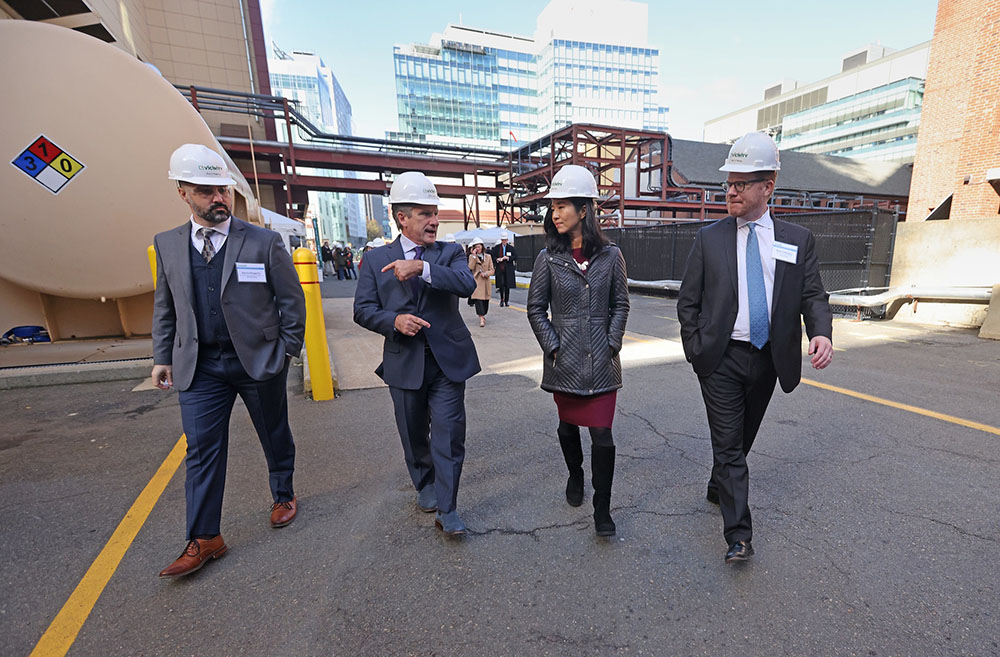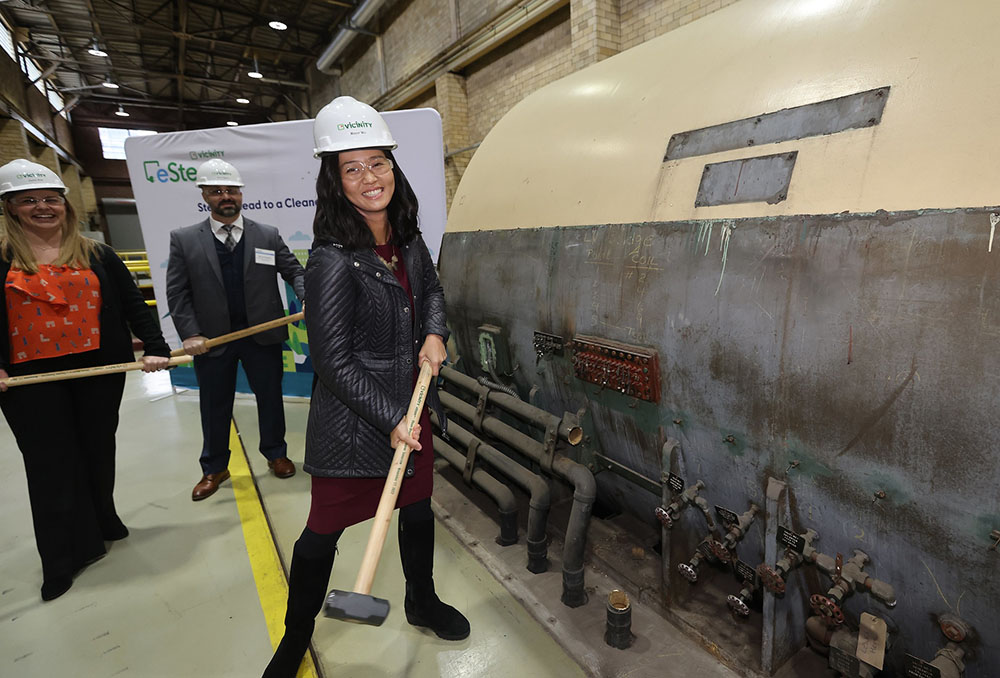Boston mayor Wu kicks off Vicinity Energy’s electrification plans with the deconstruction of a steam turbine

Vicinity Energy; Boston mayor Michelle Wu; and Matt O’Malley, chief sustainability officer, Vicinity Energy.
Boston, MA Vicinity Energy, a decarbonization leader with the nation’s largest portfolio of district energy systems, serving over 70 million s/f of building space across Boston and Cambridge, has officially kicked off its electrification plans with the deconstruction of a steam turbine at the Kendall Green Energy Cogeneration Facility. Vicinity will install an electric boiler in its place, marking a critical step in the company’s Clean Energy Future commitment to reaching net zero carbon emissions across all its operations by 2050.
Mayor Michelle Wu commemorated the day at Vicinity’s Kendall facility. Marking a crucial step toward a clean energy future for Boston and Cambridge, the deconstruction aligns with the mayor’s latest move to file a home rule petition to ban the use of fossil fuels for new buildings in Boston.
“It is remarkable to be able to say that Vicinity is the first energy company in the country to electrify its operations. That is a huge deal and one that will have ramifications for generations to come. For every gigantic natural gas boiler that’s going to be decommissioned, for every new building that will use eSteam, those are jobs created right here for our residents and our communities,” said mayor Wu. “It is clear that the work of ensuring our planet remains livable is going to require all of us: every level of government, business, and community. We’re very grateful that Vicinity’s carbon-free eSteam product will power the leading industries we’re already known for here in Greater Boston such as life sciences, healthcare, commercial real estate, and many more.”

Kendall Green Energy Cogeneration Facility. Vicinity will install an electric boiler in its place, marking a critical
step in the company’s Clean Energy Future commitment to reaching net zero carbon emissions across all its operations by 2050.
“With the installation of this electric boiler, we are enabling a seamless conversion to carbon-free eSteam for our customers, including innovative commercial building owners and developers like IQHQ,” said Bill DiCroce, president and CEO of Vicinity Energy. “This is game-changing for our communities and a prime example of what happens when government, the business community, and the energy sector work together and embrace the region’s Green New Deal.”
The electric boiler will enter service in 2024. At that time, the company will procure electricity from renewable, carbon-free energy sources such as wind, solar, and hydro to generate eSteam, the first-ever carbon-free renewable energy product. IQHQ will be Vicinity’s first customer to power the rapid decarbonization of its buildings in Boston’s Fenway neighborhood: 109 Brookline and Fenway Center Phase 2 with carbon-free eSteam.
“Today, we are excited to be celebrating the installation of the electric boiler,” said Jenny Whitson, director of sustainability & ESG at IQHQ. “By Vicinity taking this step to offer developers like us the opportunity to source electric steam generated by renewable energy, we are able to achieve our climate goals and carbon emission reduction targets for our projects.”
Over the years, Vicinity has evolved as new, cleaner fuel sources have become commercially available. The company’s predecessors burned coal to generate steam before migrating to oil, natural gas, and combined heat and power (CHP). Because district energy systems are agnostic to fuel type, they can quickly implement these new, more sustainable technologies and fuel sources. Electrification is the next crucial step to decarbonize Boston and Cambridge at scale and ensure both municipalities meet their new energy standards and emission mandates.
The Kendall Green Energy Cogeneration Facility simultaneously produces thermal energy and electricity in one efficient process to serve approximately 75% of Vicinity’s customers throughout the region. When the electric boilers begin service, all of these facilities will have access to carbon-free, renewable energy at once.
“Here in Kendall Sq., a place known for global innovation, we are proud of Vicinity’s contribution to urban decarbonization with eSteam,” said Beth O’Neill Maloney, executive director at the Kendall Sq. Association. “Vicinity’s electrification plans will help contribute to the decarbonization of Cambridge and Boston without building-level changes. Vicinity is a global sustainability leader, charting a new path forward for district energy.”
Vicinity is on track to fully electrify its steam generation in Boston-Cambridge and introduce other technological advancements into its operations, including industrial-scale heat pumps and molten salt thermal energy storage. The company’s other locations across the country will undergo similar electrification processes in the coming years.
Newmark negotiates sale of 10 Liberty Sq. and 12 Post Office Sq.


How COVID-19 has impacted office leasing - by Noble Allen and John Sokul

Make PR pop by highlighting unique angles - by Stanley Hurwitz

Five ways to ruin a Section 1031 Like-Kind Exchange - by Bill Lopriore








